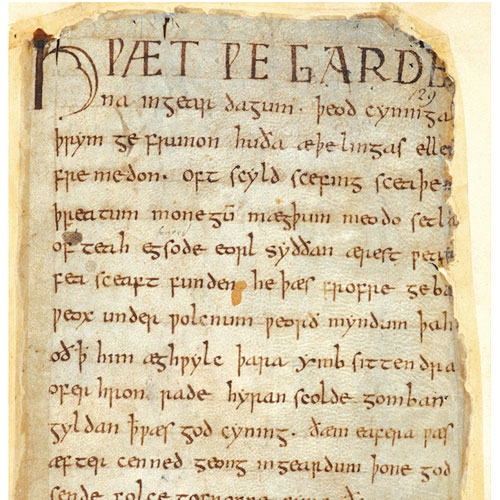
The first folio of the epic poem Beowulf, (detail) written primarily in the West Saxon dialect of Old English (British Library)
What is the wer in werewolf? Where did the pronoun she come from? (And why was it voted the Word of the Millennium?) When did double negation become non-standard, and who first said (erroneously) that two negatives make a positive? Is must really being replaced by hafta?
Why and how do living languages change?
The answer, in a word, is fascinating. Linguist and English language historian Anne Curzan leads a whirlwind tour across the language’s shifting landscape, from Beowulf written about one thousand years ago, to blogging. The history of English, Curzan says, is linked to its contact with other languages. She explains the impacts Old Norse, the Celtic languages, French, and Latin had in early stages of the language, as well as that of hundreds of other languages since. It’s no wonder that linguists now talk about the “Englishes” spoken around the world.
The language’s history continues, and new technologies stake more claims to a place in the vocabulary. Right now there is a fear that texting could destroy the written language. But, Curzan says, linguists are tracking the effects of the Internet and social media—and they don’t suggest “decay” in the language.
After what the English language has undergone over the past millennium, you hafta believe it will survive.
Curzan is the Geneva Smitherman Collegiate Professor of English, Linguistics, and Education and dean of the College of Literature, Science, and the Arts at the University of Michigan.
Patron Information
- If you register multiple individuals, you will be asked to supply individual names and email addresses so they can receive a Zoom link email. Please note that if there is a change in program schedule or a cancellation, we will notify you via email, and it will be your responsibility to notify other registrants in your group.
- Unless otherwise noted, registration for streaming programs typically closes two hours prior to the start time on the date of the program.
- Once registered, patrons should receive an automatic email confirmation from CustomerService@SmithsonianAssociates.org.
- Separate Zoom link information will be emailed closer to the date of the program. If you do not receive your Zoom link information 24 hours prior to the start of the program, please email Customer Service for assistance.
- View Common FAQs about our Streaming Programs on Zoom.